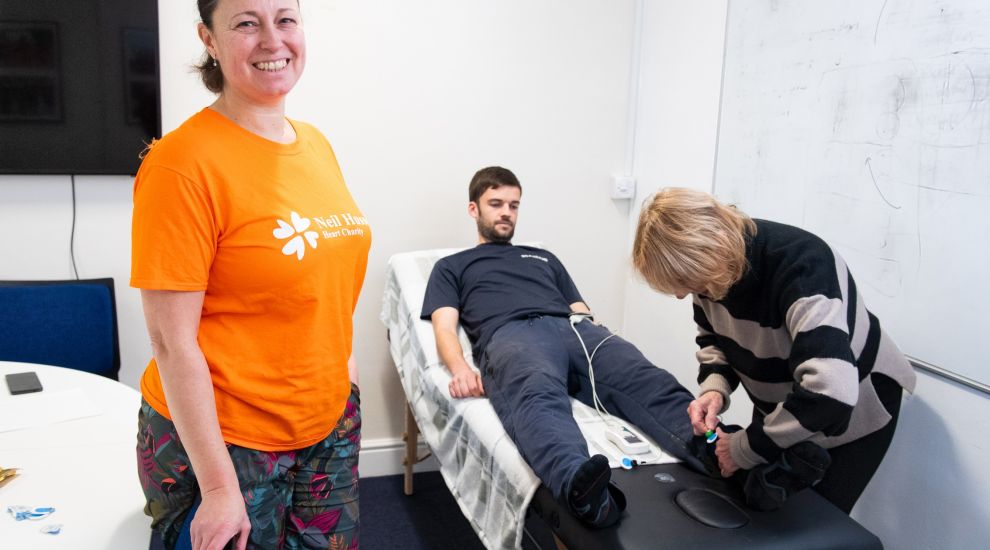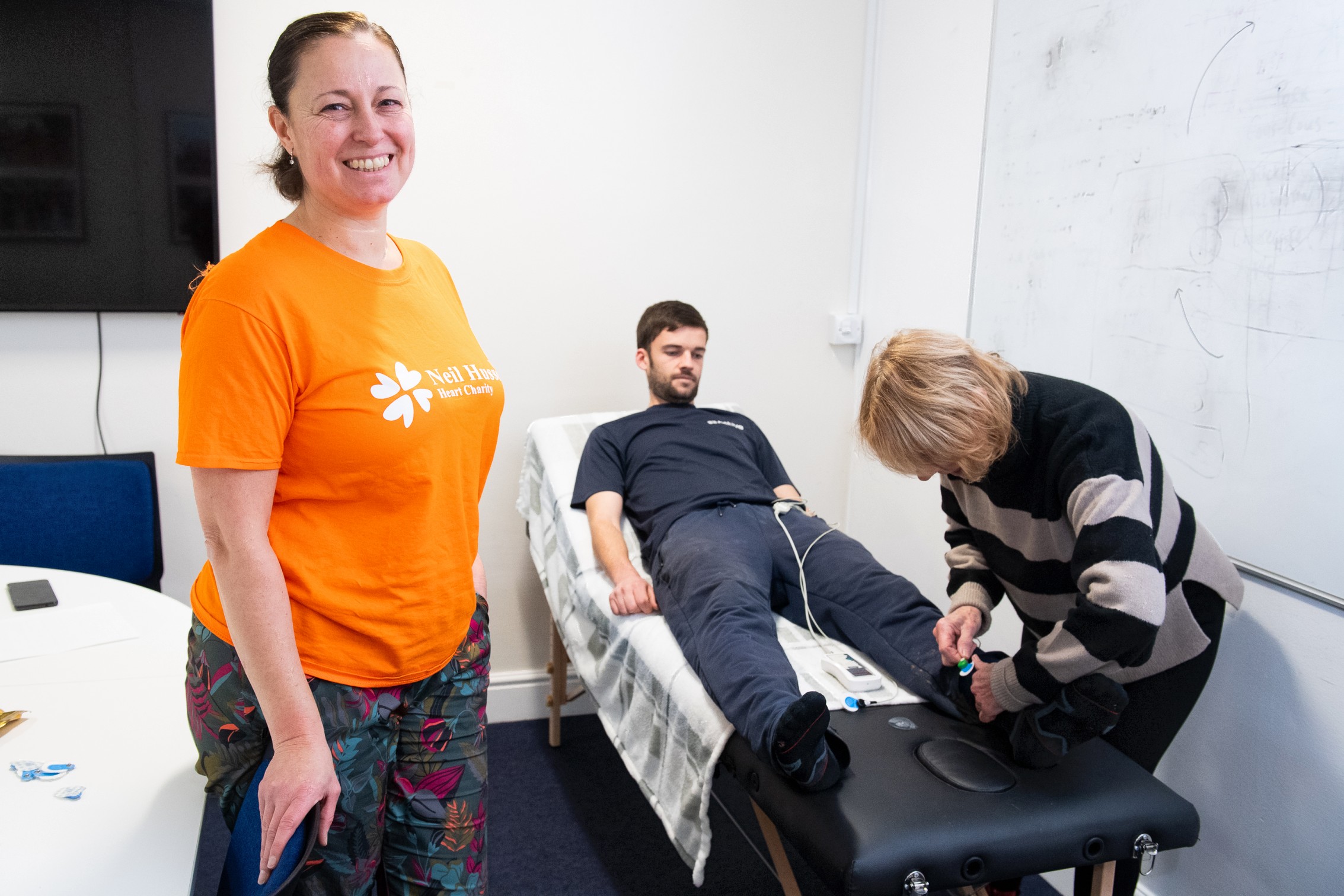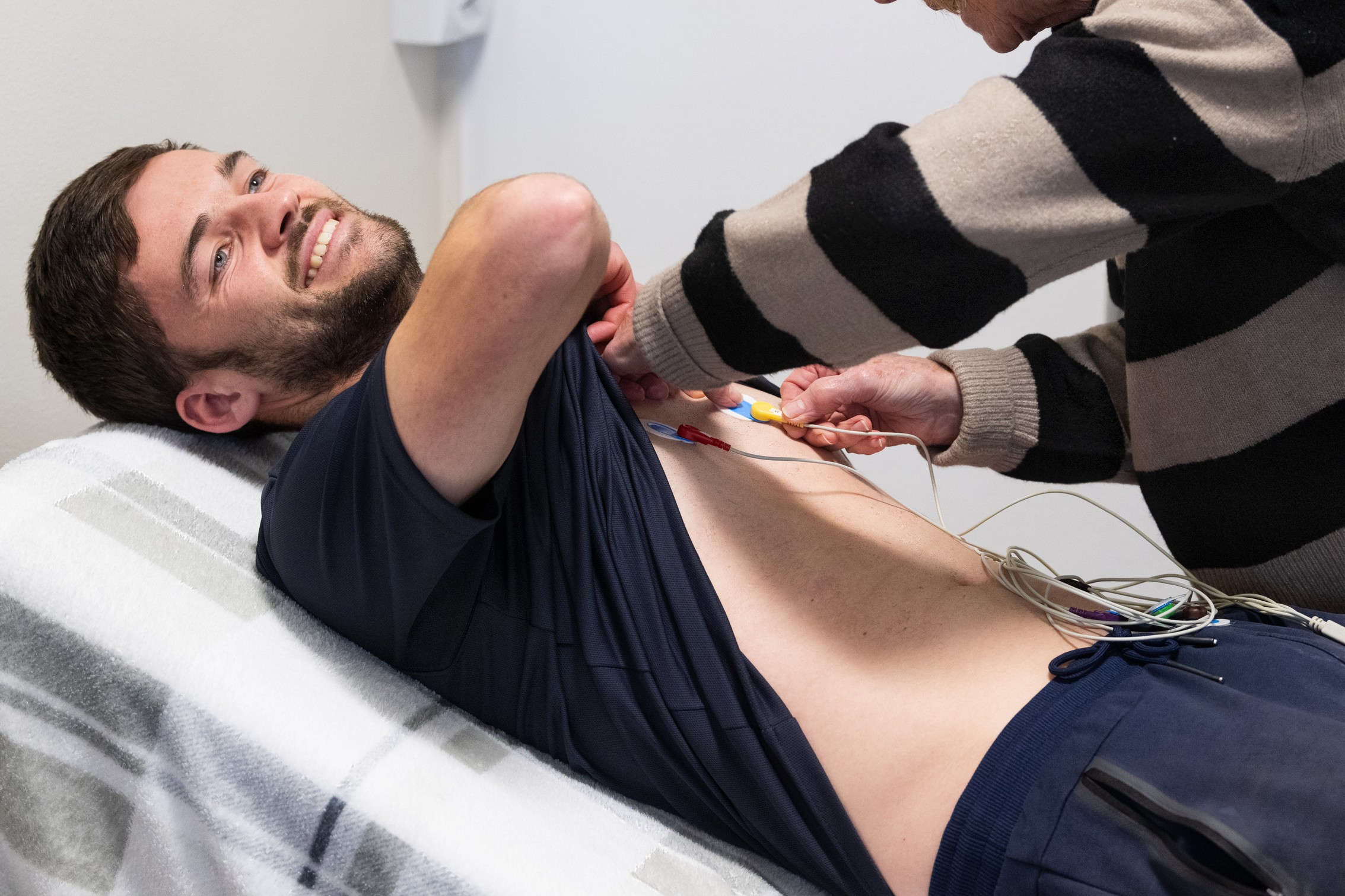


After islander Neil Hussey died suddenly whilst cycling at the age of 40, his wife decided to launch a charity in his name to detect heart conditions and prevent any further families suffering the same devastation.
Neil's family had no idea he had underlying heart conditions until they were discovered during an autopsy after his death in 2016.
In the years following the tragic loss, Neil’s widow Blanca Palacin launched the Neil Hussey Heart Foundation which is the only organisation in Jersey that offers free electrocardiogram (ECG) tests.

Pictured: Blanca (left) lost her husband unexpectedly to an undiagnosed heart condition.
Having now been fully operational for five years, the charity has tested to hearts of hundreds of young islanders.
Blanca spoke to Express about her journey after the shock of losing Neil, and why taking up the charity’s offer of a free ECG is so important.
She said. “Neil was very sporty. He had been a swimmer, he was in a cycling club, he ran as well and had a very healthy lifestyle, but he passed away while he was cycling. The autopsy revealed afterwards that he had heart conditions that we were not aware of.”
“So we decided two years after his death, with family and friends, to set up the charity in order to detect undiagnosed conditions, because in many instances, there's no symptoms, or they may have been misread or may not feel relevant to the heart, for example thinking that you have indigestion or you feel dizzy because you haven't had anything to eat."
Blanca explained: “I had no experience at all, but I was surrounded by friends who were very determined to make this happen.
"So we spoke to different people who had set up a charity before and Dr Andrew Mitchell, a cardiologist here in Jersey, put us in the right direction in terms of where there was a gap in Jersey that we could fill with a charity, because unless you've got symptoms, you wouldn't be given an ECG.”

Pictured: An ECG test with the charity takes 15 minutes per person and has the potential to save a life.
The Neil Hussey Heart charity offers free ECGs to any groups of people aged 16 to 30.
The human heart is consider an 'adult heart' at the age of 16, whilst the current cap at 30 is to deal with the small nature of the charity and number of medical volunteers available.
An ECG measures the electrical activity of the heart from different angles using small electrode stickers placed on the skin.
Blanca said: “It’s a non-invasive test doesn't measure everything, but it gives you a really good picture of certain things. So, it can highlight arrhythmias, which are irregular heartbeats that may have consequences in future.
“It can also see the levels of chemicals in your heart and in your bloodstream, like potassium, which can have consequences if those levels are high. It can also detect congenital issues (something present from birth).
"So there's a range of things that it can identify, but an ECG is always the first step and if it finds anything then someone can investigate further.”
Blanca also pointed to the tragic death of basketball player Guillaume Pierre Hoareau, who collapsed mid-game and later died in hospital last year.
Guillaume was the same age as Neil when he died on 18 May 2024 as a result of left-dominant arrhythmogenic cardiomyopathy, a structural anomaly to his heart, which was identified in an inquest into his death.
The inquest also heard that his condition was regularly monitored.
“These tragic events are highlighting the need to have a check,” Blanca said, adding that the aim of the test is to reassure rather than frighten.
"I think the fear is that people don't know what [the test] is going to be like, but we reassure them that there's nothing to fear," she said.
"Other people are also frightened of finding out that they've got something, but if have then it is better to know before it’s too late.”
Prevention is a central pillar of the charity’s work, added Blanca.
"It prevents sudden deaths which are always devastating and ensures that your loved ones are going to enjoy you for longer," she said.
"Like everything, prevention is easier than fixing it afterwards, and in some cases, you cannot fix it.”
One of the sport clubs which recently took up the charity’s offer of free ECG testing was St Ouen’s Football club.
The club arranged for some of its players to undergo the 15-minute test.
Dennis McGee was the main organiser behind the club's tests and said having them provides an “extra layer of reassurance” for those who play sports.
“I think it's becoming more and more important for players to be reassured in some way," he said.
"It's difficult if something is undiagnosed or players don't really have an idea of what might be happening.
"It's just an extra layer of reassurance for them to have a test, especially if it's been provided free of charge and well organised, as it has been.”
Pictured: 24 players from St Ouen's football club were tested last month
Dennis supported the charity’s hopes that sporting bodies on the island, like the Jersey Football Association, will work to implement annual checks for their members.
Having tested more people this year than ever this year due to increasing the charity's offering to workplaces and taking on more volunteers, Blanca said that more should be done for organisations to introduce routine testing for the safety of their members or employees.
She explained: “It would be a great move if clubs introduce some sort of medical check, But like everything, if they encourage it they make it easy for the individual to do it. But in many other jurisdictions, before joining a club or doing any sport you are required to have a check.”
Sports clubs are not the only group that can come forward for testing. The Neil Hussey Heart charity will test any groups of eight or more people, whether that is a school, workplace or group of friends.
Blanca said: “If an individual wants to contact us and they are able to put a group together, we can look for premises and we can make it happen. We bring everything, we just need a room.”
For those schools who have not yet been in touch with the charity, Blanca wants to urge them to sign up to get their 16-to-18-year-old students tested before they leave school and potentially the island.
However, a larger scale change when it comes to how society views health checks is needed to fully prevent further tragic loss in the community, Blanca added.
“Something that really needs to change in our society is the way we look after ourselves," she said.
"Visiting a doctor once a year to have a blood test is important so we build some history in terms of things like cholesterol levels, or blood pressure, which can cause heart attacks.
"It’s important that everybody, even though someone feels healthy and fine, visits a doctor as there may be silent events behind that can only be intercepted by a visit to the GP.”
As they look to another record year in 2025, Blanca wanted to celebrate her “invaluable” volunteers for the work they do and said the charity’s success can be credited to them.
“All these people, our doctors, nurses, paramedics, admin staff, work as well and they are invaluable to us.
"They manage to find a couple of hours to help us and they are really the success of what we do.”
To support the work of the Neil Hussey Heart Charity or to register for a free ECG test, visit the charity's website here.
Comments
Comments on this story express the views of the commentator only, not Bailiwick Publishing. We are unable to guarantee the accuracy of any of those comments.